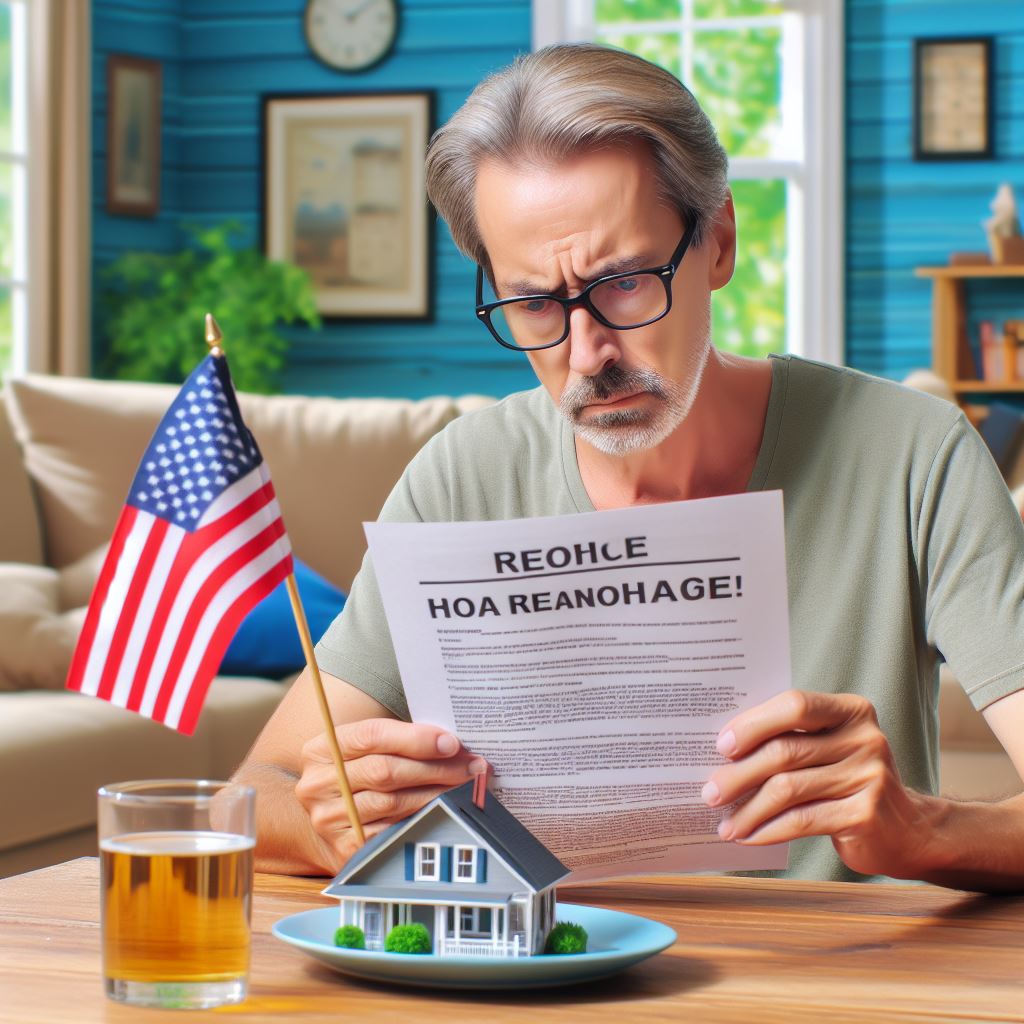Introduction
A homeowners association (HOA) lien is a legal claim placed on a property by the HOA for unpaid fees or fines.
It is directly related to real estate ownership and can have significant implications for homeowners.
The purpose of this blog post is to provide a comprehensive explanation of HOA liens and how they can ultimately lead to foreclosures.
By understanding the intricacies of HOA liens, homeowners can take proactive measures to safeguard their properties.
HOA liens are the result of homeowners failing to pay their association fees or violating any rules set by the HOA.
Once a lien is placed, it becomes a public record, encumbering the property and affecting its marketability.
If the outstanding fees remain unpaid, the HOA has the right to initiate the foreclosure process.
This means that the HOA can legally sell the property to recover the debt.
Foreclosure should always be seen as a last resort, as it can have severe consequences for homeowners.
Losing one’s home and damaging credit are some of the potential outcomes.
It is crucial for homeowners to understand the implications of HOA liens and take prompt action to resolve any disputes or outstanding payments.
In the following sections, we will delve deeper into the specifics of how HOA liens work, the foreclosure process, and the steps homeowners can take to prevent or resolve such situations.
By the end of this blog post, readers will have a comprehensive understanding of HOA liens and foreclosures.
What is a HOA Lien?
A HOA lien is a legal claim placed on a property by a homeowners’ association for unpaid dues or violations of the association’s rules.
Different types of HOA Liens
- Assessment liens: Placed when homeowners fail to pay their regular fees and dues to the association.
- Fines or penalties liens: Imposed for violations of the association’s rules and regulations.
- Attorney fees liens: Created when the association incurs legal costs to collect overdue fees.
Legal basis and enforcement of HOA Liens
In order to create a lien, homeowners’ associations rely on the legal provisions outlined in their governing documents, including their CC&Rs (covenants, conditions, and restrictions).
Transform Your Real Estate Decisions
Unlock personalized real estate insights crafted just for you. Get actionable advice designed to amplify your success.
Get StartedWhen homeowners fail to meet their financial obligations to the association, the association can file a lien against the property in question.
Once the lien is established, the association can take various steps to enforce it.
These may include sending demand letters, imposing additional fines and penalties, and ultimately, initiating foreclosure proceedings.
Foreclosure is usually the last resort for the association to recover unpaid dues.
Before initiating foreclosure, the association must follow a specific legal process, which typically involves providing notice to the homeowner.
If the homeowner fails to respond or resolve the outstanding debt, the association can proceed with the foreclosure sale.
At the foreclosure sale, the property is auctioned off, with the proceeds being used to pay off the outstanding debt.
If the property is sold, the new owner becomes responsible for paying the outstanding dues and adhering to the association’s rules.
If the property does not sell at the foreclosure auction, it may revert to the association as lender.
In such cases, the association can choose to rent out the property or sell it on the open market to recover its losses.
Overall, HOA liens are a means for homeowners’ associations to enforce the payment of dues and adherence to the association’s rules.
These liens provide the association with legal recourse to pursue unpaid debts and protect the financial stability of the community.
However, it is important for homeowners to understand their rights and obligations regarding HOA liens and to communicate with their association to avoid or resolve potential issues.
By maintaining open lines of communication and fulfilling financial obligations, homeowners can avoid the potential consequences of HOA liens and foreclosures.
Showcase Your Real Estate Business
Publish your company profile on our blog for just $200. Gain instant exposure and connect with a dedicated audience of real estate professionals and enthusiasts.
Publish Your ProfileRead: Estate Planning: Protecting Your Real Estate
How HOA Liens Lead to Foreclosures
In this blog post, we will explore how HOA liens can lead to foreclosures and the steps that homeowners can take to avoid such consequences.
When homeowners fail to pay their HOA dues or resolve violations, the association has the right to take legal action.
One of the actions that an HOA can take is filing a lien against the property.
This involves a multi-step process that includes notifying the homeowner, providing them with a chance to resolve the issue, and ultimately placing a lien on the property if they fail to do so within a specified timeframe.
Process of filing a lien against the property, including the necessary steps and timelines involved
It is crucial for homeowners to understand the timelines involved in the filing of a lien.
Typically, the HOA will send multiple written notices to the homeowner before initiating the legal process.
These notices will specify the amounts owed and provide a deadline for payment or resolution.
If the homeowner fails to comply with the notices and does not pay the necessary dues or resolve the violations within the specified timeframe, the HOA will move forward with the next step.
This involves filing a lien with the county or local government, establishing the association’s legal claim on the property.
Once the lien is in place, the homeowner’s options become limited.
Selling or refinancing the property can become challenging, as the lien must be satisfied before any transfer of ownership can occur.
Additionally, the association may pursue legal action to collect the unpaid dues or violations.
Importance of prompt payment and resolution to avoid further legal consequences
Prompt payment and resolution are crucial to avoid further legal consequences.
Homeowners should prioritize addressing any outstanding dues or violations as soon as possible to prevent the situation from escalating to a foreclosure.
Keeping open lines of communication with the HOA and seeking resolution options can help mitigate the risk of foreclosure.
It is worth noting that foreclosure is typically a last resort for HOAs.
Associations prefer to resolve issues amicably and maintain positive relationships with their homeowners.
However, when all other options have been exhausted, foreclosure may become necessary to protect the interests of the association and its members.
In short, HOA liens can indeed lead to foreclosures when homeowners fail to pay their dues or resolve violations.
Understanding the process of filing a lien and the necessary steps involved is crucial for homeowners to avoid legal consequences.
Prompt payment and resolution are key to maintaining a positive relationship with the HOA and preventing further complications.
Read: Pets and HOAs: Knowing the Rules

Consequences of HOA Liens
Potential consequences of HOA liens, such as damage to credit scores and difficulties in obtaining loans
HOA liens can have serious implications on homeowners, affecting not only their financial standing but also their overall well-being.
Understanding the consequences of HOA liens and the subsequent foreclosure proceedings can help homeowners take appropriate action to protect their interests and avoid potential hardships.
One of the significant consequences of HOA liens is the damage they can cause to a homeowner’s credit score.
When a homeowner fails to pay their HOA dues or violates any other association rules, the homeowners’ association can file a lien against the property.
This can negatively impact the homeowner’s credit score, making it challenging to obtain favorable terms on future loans or mortgages.
Furthermore, having an HOA lien on record can create difficulties for homeowners seeking loans or refinancing opportunities.
Lenders view these liens as a potential risk, indicating a homeowner’s financial instability.
Showcase Your Real Estate Business
Publish your company profile on our blog for just $200. Gain instant exposure and connect with a dedicated audience of real estate professionals and enthusiasts.
Publish Your ProfileAs a result, obtaining loans for various purposes, such as home improvements or other personal needs, becomes challenging or even impossible.
If homeowners fail to address the HOA lien promptly, it can escalate to foreclosure proceedings.
Foreclosure is a legal process by which the lender, which in this case is the homeowners’ association, takes ownership of the property due to non-payment or violation of the association’s rules.
This can cause significant distress for the homeowner.
Impact of a foreclosure on the homeowner, including the loss of the property and potential legal costs
The impact of foreclosure on homeowners is severe. Ultimately, they lose ownership of their property, often being forced to vacate their homes.
The process can be emotionally tumultuous, as homeowners are uprooted from their familiar surroundings and face the possibility of finding alternative housing.
Additionally, the financial consequences of foreclosure can be long-lasting. Homeowners subjected to foreclosure may also face potential legal costs.
Legal fees and court expenses associated with defending against foreclosure actions can further exacerbate the financial burden.
Homeowners may find themselves in a complex legal battle, adding stress to an already distressing situation.
To mitigate the consequences of HOA liens and foreclosure, homeowners should ensure prompt payment of their HOA dues and adhere to all association rules.
Open communication with the homeowners’ association can also help address any potential issues or disputes before they escalate.
Seeking legal counsel may be necessary in cases where foreclosure seems imminent.
In a nutshell, the potential consequences of HOA liens can be severe.
Damage to credit scores, difficulties in obtaining loans, and the possibility of foreclosure create a challenging situation for homeowners.
Understanding these implications and taking proactive measures can help homeowners protect their rights, avoid foreclosure, and maintain their financial stability.
Read: Avoiding Common Estate Planning Mistakes
Homeowner’s Rights and Remedies
When homeowners find themselves facing a HOA lien, it is important for them to understand their rights and explore possible remedies.
This section will detail the rights of homeowners and the actions they can take to address the situation.
Rights of homeowners when faced with a HOA lien
One of the primary rights that homeowners have when faced with a HOA lien is the opportunity to challenge the validity of the lien.
They can question the lien’s filing correctness or spot any inaccuracies in documentation.
If homeowners believe there is a problem with the lien, they should gather evidence to support their claim and present it to the appropriate parties.
This may include contacting the HOA directly or consulting with legal professionals who specialize in HOA-related matters.
Available remedies for homeowners
In addition to challenging the validity of the lien, homeowners also have various remedies available to them.
One common option is negotiating a payment plan with the homeowners’ association.
This can involve discussing a manageable repayment schedule that works for both parties.
Prepare to present your financial situation, offering a reasonable proposal showing commitment to obligations.
Engaging in open communication and showing a willingness to cooperate can often lead to successful negotiations.
If negotiations fail, homeowners may need legal help if rights are violated by the HOA.
Legal professionals who specialize in HOA law can provide guidance and representation throughout the process.
Importance of open communication and cooperation with the homeowners’ association
It is crucial for homeowners to understand that open communication and cooperation with the homeowners’ association are key.
Showcase Your Real Estate Business
Publish your company profile on our blog for just $200. Gain instant exposure and connect with a dedicated audience of real estate professionals and enthusiasts.
Publish Your ProfileBy maintaining a positive relationship, homeowners can increase their chances of finding a resolution that benefits all parties involved.
Regularly attending HOA meetings and staying informed about any changes in policies or regulations can help homeowners avoid potential disputes and misunderstandings.
It is also important to be proactive in addressing any concerns or issues that arise.
In conclusion, when faced with a HOA lien, homeowners have the right to challenge its validity and pursue remedies such as negotiating payment plans or seeking legal assistance.
Open communication and cooperation with the homeowners’ association are crucial for resolving issues and maintaining a positive relationship.
Being proactive and staying informed can help homeowners prevent future problems.
Read: Joint Property Ownership in Estate Planning
Conclusion
Understanding HOA liens and foreclosures is crucial for homeowners.
Timely payments and compliance with HOA regulations are essential to avoid the risk of liens and foreclosure.
To further educate yourself on this topic, you can refer to the following resources:
- HOA Liens and Foreclosures: What Homeowners Need to Know
- What Is a Lien? How HOA Liens Work
- HOA Foreclosure Overview: How to Avoid Losing Your Home
By being proactive and well-informed, homeowners can protect their properties and maintain a harmonious community environment.




